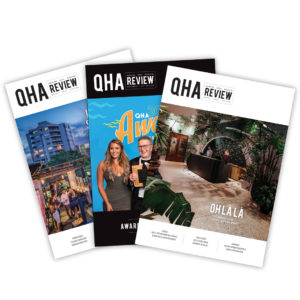As gaming in Queensland licensed venues recommenced as part of Stage 3 easing of restrictions in July, the State Government worked closely with industry and Gambling Help services to ensure those at a heightened risk of gambling harm as a result of the financial and emotional implications of COVID-19 had support available.
To encourage patrons to check their gambling habits following the lockdown, the Office of Liquor and Gaming Regulation (OLGR), in consultation with industry and Gambling Help services, developed a Facebook campaign to support at-risk patrons.
The key message of the campaign was Getting help is a safe bet and encouraged patrons to consider their gambling habits following lockdown. It also asked family and friends to identify the signs of problem gambling. The target audience was directed to the Gambling Help Queensland website for information.
Over the month-long period it was in market, the campaign reached close to 150,000 people, resulting in more than 310,000 views and nearly 2,200 visits to the Gambling Help website.
I would like to thank those venues that shared the campaign through their own channels.
The most clicked campaign post was about recognising the signs of problem gambling in a loved one. This highlights the importance of gaming staff knowing how to respond if they are approached by a concerned family member or friend.
An online guide was also developed and made available on the Business Queensland website to remind venues of practices they should be undertaking to protect vulnerable patrons. This includes information on self-exclusion, which is an important option for people who may want to continue their break from in-venue gambling beyond the shut-down.
Self-exclusion processes have been streamlined to assist Gambling Help services to facilitate remote (off-site) self-exclusions where a patron does not have to physically attend the venue. Feedback on these changes has been quite positive from both venues and patrons who have found the process easier to undertake.
Venue staff need to be aware that they must process remote self-exclusion requests promptly when they receive them.
It is also important that venue promotions are being undertaken responsibly, particularly at a time when many patrons may be experiencing hardship or stress as a result of the pandemic. There are plenty of exciting things to be shared as venues reopen without having to focus on promoting gambling, which can be a trigger for vulnerable members of our community.
The Queensland Government provides more than $6 million per year to deliver free, confidential problem gambling counselling and support through Gambling Help Queensland.
This includes the 24-hour, 7-day-a week Gambling Helpline (1800 858 858) and internet-based counselling service, face-to-face counselling services operating across the state, and additional counselling services delivered from alcohol and drug support services in four locations. Building a close and positive relationship with your local Gambling Help service can make it easier if the time comes to refer a patron in need of assistance.
I’d encourage all licensees and all their staff to link in with your local Gambling Help service and review the range of help and support resources for patrons available on the Gambling Help Queensland website at gamblinghelpqld.org.au.
Collecting and keeping contact information at your venue
In the last issue of QHA Review, I noted the critical importance of venues collecting contact information.
Unfortunately, compliance officers are continuing to find some venues have insufficient controls to ensure mandatory details required for contact tracing purposes are collected for all guests and staff. While this is required to achieve compliance with both the approved Industry COVID Safe Plan and the Chief Health Officer’s Restrictions on Businesses, Activities and Undertaking Direction (health.qld.gov.au), most importantly it is a protection for your customers and staff.
Here’s a refresher on collecting and keeping contact information for your patrons:
Required contact information
- Collect contact information for ALL guests and staff and keep for 56 days. (Note: This is not required for takeaway or home delivery).
- This information must include:
- Name
- Phone Number (mobile preferred)
- Email address
(or physical address if email not available) - Date and time period of entry for each patron
Collection methods
- It is your responsibility to ensure that the required information is collected for every person. It is not satisfactory to leave it up to patrons to self-manage this process, e.g. by leaving a register on the front counter.
- We strongly recommend collecting patrons’ details as they enter, rather than when they are seated to ensure that you receive every person’s details.
- Be careful as to how you are collecting information to ensure you don’t expose your patrons to possible information theft.
- Businesses must use personal information only for the purpose it is being collected for. That is, personal information must not to be used for marketing purposes, or sold to third party organisations
However you choose to store contract tracing information, it must be provided immediately (i.e. within 1 hour) when required by a public health officer. This includes OLGR compliance officers and Police who are appointed under the Public Health Act and may ask you to produce the information so they can confirm it is complete and you are able to meet the requirement to produce.
Public health officers will contact the business owner or operator if a person diagnosed with COVID-19 states they attended the business at a time when they were considered infectious. This may be in person or via telephone.
Failure to provide contact information records in a timely manner may result in enforcement action (fine of $1,334 for individuals and $6,672 for corporations).
I thank all hotels for their cooperation in collecting and storing the accurate contact information for all their patrons. Together, we are making a difference.

